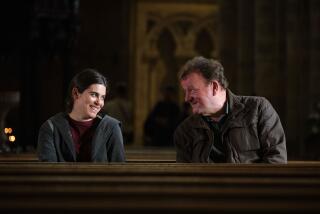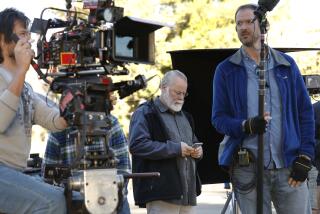Review: Ken Loach delivers a searing critique of U.K. gig economy in ‘Sorry We Missed You’
Are we surprised British filmmaker Ken Loach can see right through the pitfall-ridden gig economy? Social realist cinema’s tireless champion of the degraded, put-upon working class — his ire and compassion still going strong at 83 — has delivered another coarsely effective missive from the trenches of the modern job world with “Sorry We Missed You.”
The title of Loach’s and screenwriter Paul Laverty’s umpteenth collaboration — their last was the 2016 Palme d’Or winner “I, Daniel Blake” — refers to the politely glib wording on delivery tags stuck to doors. But it also evokes the widening chasm in the contract between faceless corporations and an overstretched, unseen, casualized workforce who can’t count on the bonds of that management/labor relationship to mean much of anything anymore.
Loach and Laverty insist we notice these 21st century vassals, through a combination of flinty charm and often wrenching drama. In the first scene, though, it’s with uneasy humor, as we watch ex-construction worker Ricky (Kris Hitchen) learn the ropes at a parcel delivery company from an imposing depot manager (Ross Brewster). The euphemisms used to explain the terms to Ricky are supposed to sound like job independence as a potential “owner-franchisee,” but they mostly reveal what will keep this proud ex-builder and family man from ever being a protected employee: Ricky will get fees, not wages; he’ll become “available” instead of “clocking on,” because it’s not a job, he’s being “onboarded”; and he won’t “drive” for them, he’ll “perform services.” Like an exploitative deal made to sound empowering — the term “master of your universe” is even used — it’s a doublespeak routine worthy of George Carlin at his most caustically observant about obfuscating language.
When Ricky sells the family car to buy a white van for his new job — because, of course, wheels aren’t provided unless rented from the company — it means his equally hardworking wife, Abby (Debbie Honeywood), a dedicated, contract home health-care nurse with her own all-over-the-city schedule, must get everywhere by bus. She finds herself parenting by phone, she and Ricky with no energy left at the end of the day for quality time with each other or their kids, brooding, artistic teenager Seb (Rhys Stone) and his smart but anxious younger sister, Liza Jane (Katie Proctor). But Ricky holds on to the idea that this arduous new gig — tracked by a high-tech scanner that keeps tabs on his every movement — will earn him enough to pull them all out of the financial hole they sank into after the economy collapsed.
But life intervenes in the form of Seb’s increasingly troubled mood and rebellious behavior, the handling of which involves time (and money) neither Abby nor Ricky have, putting added strain on the family’s bonds. That’s when Ricky begins to realize just what kind of job he took on — one that only ever seems to punish rather than reward, and demand more out of him instead of provide a sense of earned security.
Loach’s laserlike focus on hardship, desperation and inequity in any given scene is such that even a shot with a three-legged dog being walked in the background can make one wonder if the animal gets disability. But unlike some of the more schematic pile-ons in the director’s oeuvre of downtrodden woe, the intensity of this family’s cliff’s-edge financial and emotional peril — wonderfully acted with grit, humor and sensitivity by the central foursome — is authentically heartbreaking.
To watch good people fraying this way is stomach-clenching, and while it’s tempting to call “Sorry We Missed You” melodrama, the fact that Laverty and Loach take their cues from research and interviews keeps the tension visceral, not artificially heightened. More than usual for these evergreen chroniclers of everyday strife, their politics contextualizes the drama, and vice versa. In their domestic gut-punch of a story, they’ve exposed our new feudalism in a way that feels honest and blisteringly human.
'Sorry We Missed You'
Not rated
Running time: 1 hour, 41 minutes
Playing: Landmark Nuart, West Los Angeles
More to Read
Only good movies
Get the Indie Focus newsletter, Mark Olsen's weekly guide to the world of cinema.
You may occasionally receive promotional content from the Los Angeles Times.






